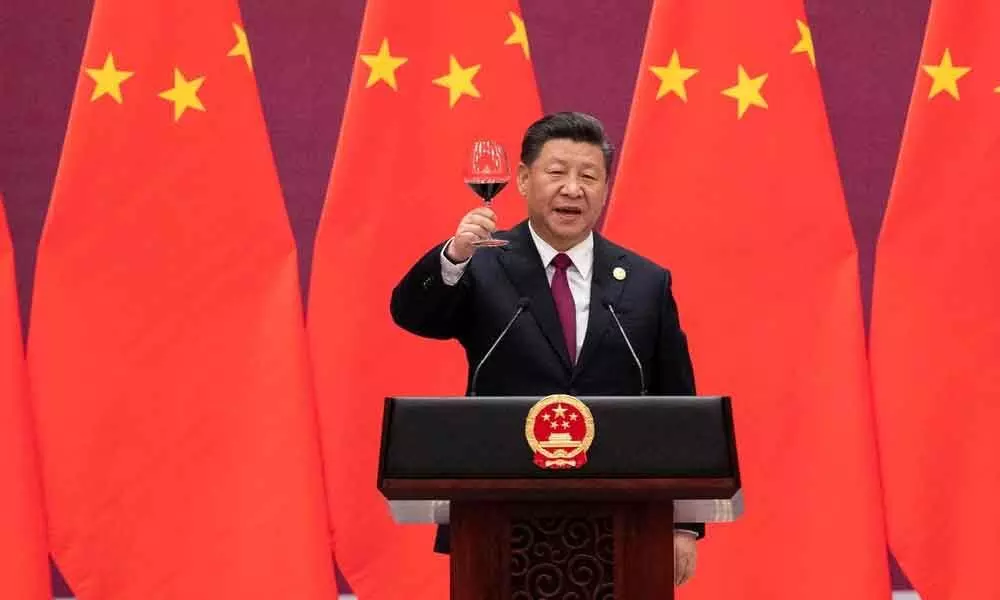Jinping's fallback on cultural nationalism

Chinese President Xi Jinping
Importantly, it is against the backdrop of accusations of repression in China on Muslims, Christians and Tibetan Buddhists that Xi Jinping addressed a national conference on 'work related to religious affairs' held at Beijing in early December and highlighted the need for religions 'to adapt to Socialist society in the Chinese context’
In his New Year message to the nation, Chinese President Xi Jinping carried forward the process of what has aptly been called 'Sinicization of Marxism.' He referred to the 'great rejuvenation of the Chinese nation' in progress and particularly appreciated the youth who have pledged to the Party 'to make their country strong' and 'save their pure true love for the motherland.'
He talked of the historical convergence of the two centenary goals in the year gone by – realisation of a 'moderately progressive society in all respects after eliminating extreme poverty' on one hand, and launch of the mission of 'building a modern Socialist country for great rejuvenation of the Chinese nation' on the other – crediting the Chinese Communist Party (CPC) for both.
Stating that this progress is not going to be easy, Xi struck a note on cultural moorings of Chinese nationalism by referring to Yellow River and the Yangtze River as the two 'mother rivers of the Chinese nation' and reaching out to 'our compatriots overseas' to compliment them for working so hard.
At the same time, religious affairs in China have been put under stricter watch since 2015 when Sinicization was introduced. Over the years, religious beliefs have attracted party control – they have been pushed towards 'alignment with Chinese culture' and rejection of foreign influence.
Importantly, it is against the backdrop of accusations of repression in China on Muslims, Christians and Tibetan Buddhists that Xi Jinping addressed a national conference on 'work related to religious affairs' held at Beijing in early December and highlighted the need for religions 'to adapt to Socialist society in the Chinese context.'
He made a significant observation that 'while freedom of belief was to be fully implemented,' religion should act as the bridge connecting 'Party and the Government' with the people and enjoined upon religious personages and believers to enhance the recognition of 'motherland, Chinese nation, Chinese culture, CPC and Socialism with Chinese characteristics.'
Classical Marxism - it may be mentioned here - did not reject right to worship but considered religion as an impediment to social change. The thought that 'religion is the opium of the people' emanated from an interpretation by Karl Marx of 'faith in an invented God' as a sentiment of 'oppressed masses' that helped them deal with the limitations they had in making demands for social change, by making 'a virtue out of suffering'.
Marxism saw religion as a tool of social control tracing it to the phenomenon of bourgeois and the church supporting each other and for that reason called for 'dictatorship of the proletariat' that eliminated religion from governance.
Communism saw no need for religion in a dispensation that provided a 'fair order'. Xi Jinping, however, can be said to have tamed Communism and Marxism to cater to the 'civilisational roots' of China and put 'cultural nationalism' on top as the guiding spirit for progress.
His overriding call for 'Socialism with Chinese characteristics' is driven by the strategy of national consolidation that took cognisance of the need to accommodate multiplicity of religions – Buddhism, Taoism, Islam, Protestants and Catholics – prevalent in China without compromising with Socialism, supremacy of CPC and civilisational heritage of the nation.
The China-Pakistan Economic Corridor (CPEC) provides the foundation for Sino-Pak strategic alliance based on a give-and-take between these two countries executed at the cost of India. It is a typical illustration of the Chinese policy of combining strategic pursuit with economic advancement.
At present, China and Pakistan – the two adversaries of India – are working together, posing a prime threat to national security on the borders, in Afghanistan and on the international front, requiring a new strategy of countermeasures that must include preparations for handling a two-front war.
A larger emerging role of India is to lead along with the US the endeavour of the democratic world to deal with the security threat arising for it from the axis of Marxist China and a fundamentalist Pakistan that harbours Islamic radicals and foments terrorism.
Xi Jinping has succeeded in acquiring a complete hold on CPC and the State, but he is also placed in a situation of great test as the Chinese President, since formidable challenges have arisen for him in geopolitics, economy and trade, security on the marine front, internal problem of keeping diverse religious communities and demographies together and dealing with the issues of Hong Kong, Macao and Taiwan.
Certainly, a distinct playing up of nationalism that restricts Marxism to keeping CPC supreme and a demand on its Socialist content to get specially attuned to 'Chinese characteristics' cannot go unnoticed by strategic analysts.
India's China policy is realistic and strong enough – we must measure up to PLA's tactics on the LAC, keep up our commitment to Quad, step up our diplomatic effort to expose the sinister Sino-Pak military alliance, deny any trade leverage to China and continue to build our Defence potential as a long term strategy.
Prime Minister Narendra Modi's regime has to be complimented for following all these leads in keeping with India's status and aspirations as a major world power.
(The writer is a former Director of Intelligence Bureau)














